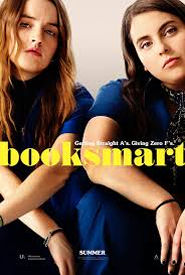Amy (Kaitlyn Dever) and Molly (Beanie Feldstein) have been best friends all the way through school, boosting each other with the desire to be top of their class when it comes time to graduate high school. However, as graduation looms they realize that the classmates whom they scorned for partying their four years of high school away are getting into the same colleges that they sacrificed their social lives for admittance. In order to make up for lost time, the two decide to go to the biggest party of the year. They just have to find out where it is first.
Booksmart is being called a female Superbad, and yeah, there are some obvious though superficial parallels. But Booksmart certainly stakes out enough of its own landscape to jump clear of any but the most casual similarities between the two films. Beanie Feldstein may be the younger sister of Superbad co-star Jonah Hill, but that is just happenstance. Her portrayal of Molly is distinct enough on her own as to eschew any thoughts that she is just a gender-flipped version of her older sibling’s character.
I’ll admit that at my age I approach teen comedies with a bit of trepidation. Sure, I have seen a lot of films in this genre, so it is hard for a movie to present something new to me and not just recycle the same gags and plots from the films that have preceded it. But as I become more removed from my teenage years, I wonder if time and the rose-tinted glasses of nostalgia have blunted the edges of the bad times and amplified the good, making me unsure if I can fully relate to the concerns of a teen-oriented film’s characters or am I just dismissing them as amplified movie fiction?
But despite Booksmart‘s use of a number of familiar tropes, it still seems startling fresh to me. At turns hilarious, sweet, honest and outrageous, the film treats its two leads with a sensitivity seldom seen in a teen comedy. The last time we saw anything close to this level was 2016’s Edge Of Seventeen. Booksmart is indeed smart, funny and honest about the potential emotional chaos of teen life and the fears generated by moving from high school to college as adulthood looms.
The big graduation party is, of course, the central fulcrum of the story, both for Amy and Molly and the film itself. Once there, Wilde subtly shifts the girls’ perception of their classmates away from the closed off, almost stereotypical view of them that they have. We, and they, now start to see their peers as having a certain amount of depth that Amy and Molly weren’t open to seeing in them before. For all their studying over the past years, this is where they learn the most valuable lessons of their teen years.
Interestingly, the way that the party scene does this also feels as if it is an indictment of past teen comedies that treated their antagonists – the snotty kids, the jocks, the cool kids, anyone else who came up against those films’ gawky teen heroes – as two-dimensional cardboard cutouts. If, as all of these films seem to say in some degree or another, high school social cliques are bad, then these films are just as bad for perpetuating the stereotypes.




